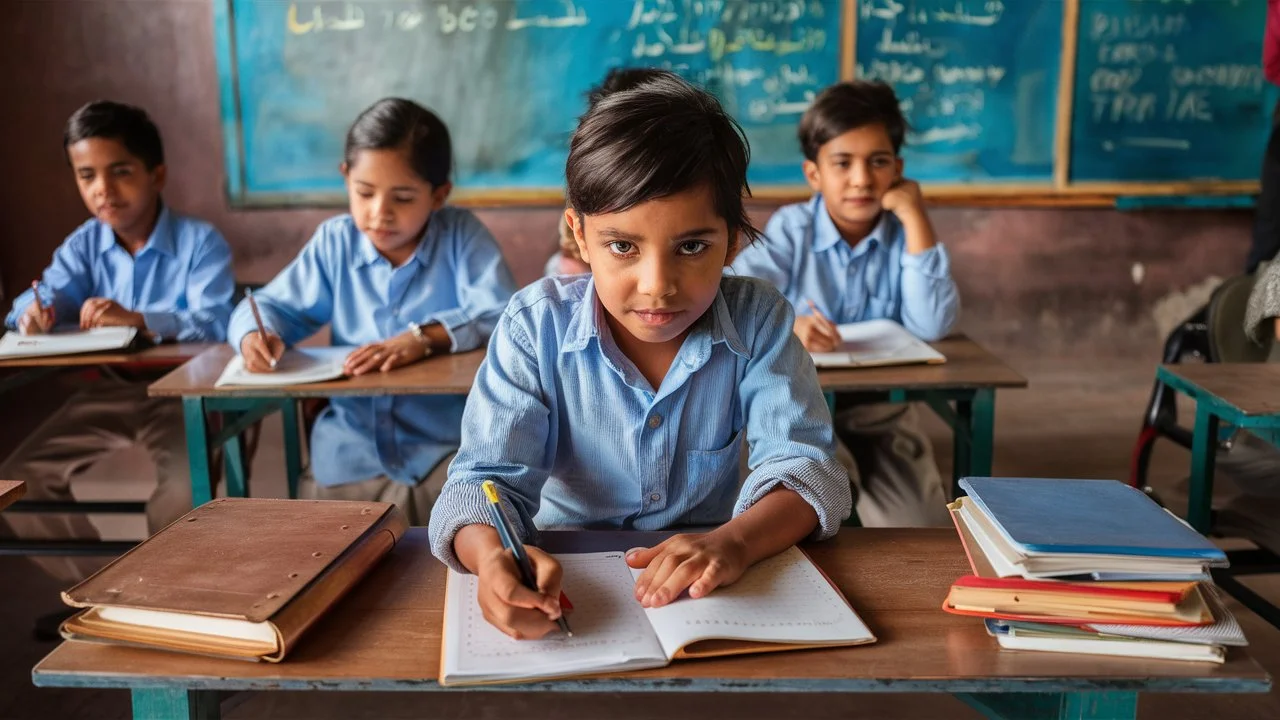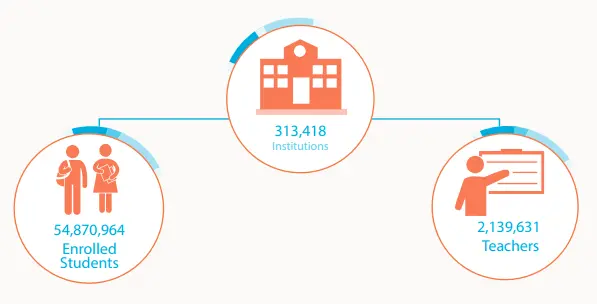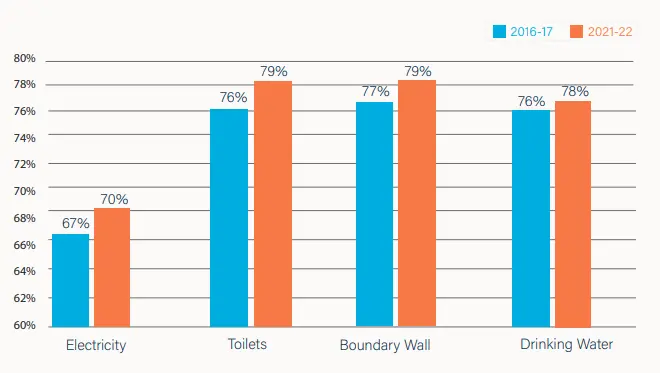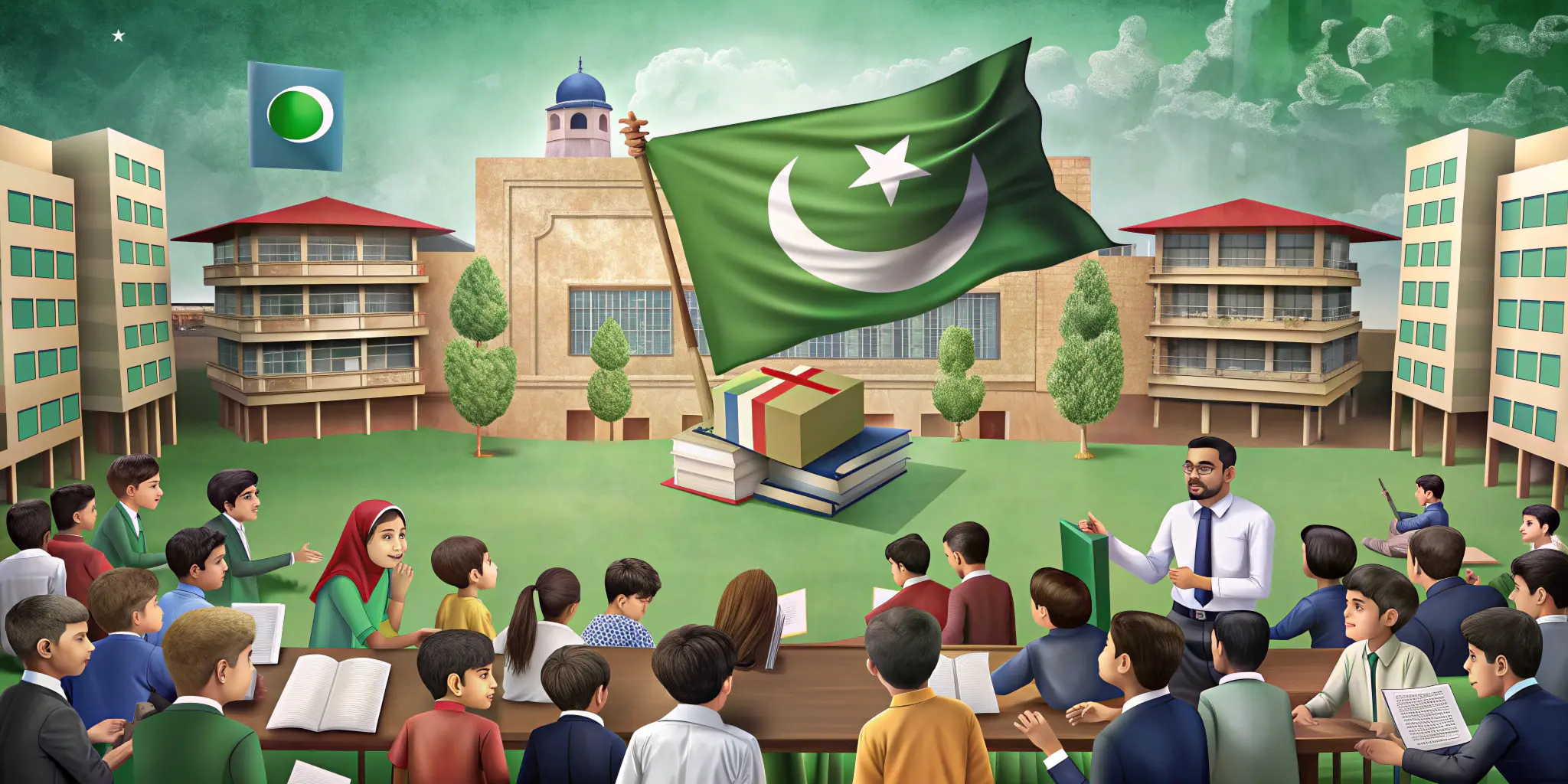Pakistan’s education system is crucial to the country’s growth. It shapes the future of its young people and drives progress in many areas. This article examines the key components of Pakistan’s education system, including its policies, curriculum, teacher training, and the impact of digital learning platforms on education.

Pakistan’s education system encompasses a diverse range of schools and institutions, including primary and secondary schools, colleges, universities, and vocational training centers. The system is continually evolving, with the government and policymakers striving to enhance education by making it more accessible and equitable for all.
A major focus is on improving education policies. These policies aim to address issues such as low literacy rates and efficient resource utilization, as well as integrating new technologies into the education system. Through these efforts, Pakistan aims to ensure that its education system contributes to the country’s growth and prosperity.
Key Takeaways
- Pakistan’s education system is a crucial driver of national development, shaping the future of the country’s youth.
- The system includes a diverse range of educational institutions, from primary and secondary schools to colleges, universities, and vocational training centers.
- Educational policies in Pakistan focus on improving access, quality, and equity across the country.
- Technological advancements and digital learning initiatives are transforming Pakistan’s educational landscape.
- Challenges such as resource allocation and infrastructure are being addressed through various initiatives and reforms.
Introduction
Pakistan’s education system is complex, influenced by its history, diverse population, and ongoing efforts to enhance access and equity. It spans from bustling cities to remote areas and encompasses a wide range of institutions, policies, and challenges crucial to the country’s growth.
Overview of Pakistan’s Educational Landscape
Pakistan’s education system includes both public and private schools, catering to students from early childhood through higher education. There is a significant disparity in access and quality between urban and rural areas.

Public schools, primarily funded by the government, aim to provide free education up to age 16. However, they face challenges such as overcrowded classrooms, outdated curricula, and a shortage of qualified teachers.
In recent years, private schools in Pakistan have experienced substantial growth, ranging from affordable community schools to prestigious international institutions. While they often offer higher quality education, they are also perceived as contributing to educational inequity in the country.
Importance of Education for National Development
Education is vital for Pakistan’s growth, serving as a key driver of economic and social progress. It not only benefits individuals but also enhances the nation’s overall well-being and prosperity.
Ensuring equal access to quality education is crucial for developing a skilled workforce, which is essential for Pakistan’s economic development. It also fosters social unity, civic engagement, and critical thinking—elements that are fundamental for democracy and economic advancement.
However, Pakistan’s education system faces challenges in providing equal opportunities for a quality education. Improving the education sector should be a top priority for policymakers and stakeholders.
”Education is the most powerful weapon which you can use to change the world.” - Nelson Mandela
Pakistan’s Educational Policies
In Pakistan, the government has introduced numerous educational policies and reforms to address challenges within the education system. These initiatives focus on enhancing curriculum quality, improving teacher training, and elevating overall educational standards.
A key initiative is the National Education Policy, which provides a comprehensive framework for the education sector. It includes guidelines on curriculum design, teaching methods, and school infrastructure. Additionally, the government supports teacher training programs to improve educators’ effectiveness.
Key areas of focus include:
- Strengthening curriculum development to meet both global standards and local needs
- Investing in teacher training and professional development programs
- Improving access to education, especially in underserved and rural areas
- Promoting the use of technology in classrooms to enrich the learning experience
- Collaborating with the private sector and international organizations to utilize resources and expertise
These policies aim to create a more inclusive and equitable education system in Pakistan. They are designed to empower the youth and support national growth. Despite ongoing challenges, the government’s commitment to quality education for all remains steadfast.
| Policy Initiative | Key Focus Areas | Impact |
|---|---|---|
| National Education Policy |
| Provides a comprehensive framework for the education sector |
| Teacher Training Programs |
| Equipping educators with the necessary competencies |
| Technological Integration |
| Transforming the learning experience and promoting digital inclusion |
The implementation of these policies is an ongoing process, with the government continually reviewing and refining its strategies to address the evolving needs of Pakistan’s education system.
By prioritizing educational policies, the Pakistani government is taking significant steps toward improvement. These efforts, including advancements in curriculum development and teacher training, are aimed at creating a better future for the country’s youth and supporting national development, provided they are executed effectively.
Curriculum Development and Implementation
In Pakistan, curriculum development and implementation are crucial aspects of the education system. The National Curriculum Framework guides this process by setting goals, standards, and guidelines for creating educational content throughout the country.
National Curriculum Framework
The National Curriculum Framework establishes the foundation for curriculum development in Pakistan. It ensures that curricula align with the country’s educational objectives, social needs, and global best practices. The framework is updated regularly to remain relevant in the evolving educational landscape.
Textbook Development and Review Process
Creating and reviewing textbooks is a crucial part of the curriculum process. These textbooks are primary tools for student learning, and their quality directly impacts curriculum effectiveness and student assessment. Subject experts, teachers, and policymakers collaborate to ensure that content is accurate, engaging, and aligned with the National Curriculum Framework.
Regular textbook reviews are essential to keep content up-to-date, error-free, and aligned with current educational standards. Feedback from teachers and students is used to make necessary adjustments, ensuring that the materials remain useful and relevant.
Pakistan continues to enhance curriculum and textbook development to provide students with high-quality education. These efforts support effective student assessment and contribute to the country’s overall growth.
Teacher Training and Professional Development
The government and schools in Pakistan recognize the critical role teachers play in shaping the future of education. Significant efforts have been made to train and develop teachers, equipping them with the skills and knowledge needed for effective teaching and student support.
Teacher training programs are a major focus, enhancing teachers’ subject matter expertise, classroom management, and use of innovative teaching methods. These programs are designed to address the diverse needs of students.
Key initiatives include:
- Comprehensive Teacher Training Programs: Emphasizing subject expertise, classroom management, and modern teaching methods.
- Continuous Professional Development: Offering workshops and seminars to keep teachers updated on the latest educational trends and best practices.
- Mentorship and Peer Learning: Encouraging collaboration and the exchange of effective teaching strategies.
- Online and Blended Learning Platforms: Providing flexible and accessible professional development opportunities.
Teachers also receive ongoing support for their professional growth through workshops, seminars, and online resources. This helps them stay current with new trends and innovations, enabling them to refine their skills and adapt their teaching to better meet students’ needs.
By prioritizing teacher training and professional development, Pakistan’s education system is building a highly skilled and dedicated teaching workforce. This commitment is essential for driving educational excellence and fostering the growth and development of future leaders.
School Infrastructure and Facilities
Quality school infrastructure and facilities are essential for a robust education system in Pakistan. However, the country faces significant challenges in this area, which impact both student progress and the learning environment.
Challenges in Providing Adequate Infrastructure
Many schools lack essential facilities such as proper ventilation, lighting, and seating, which hinders students’ ability to focus and learn effectively. Additionally, access to clean drinking water and adequate sanitation facilities is a significant issue, particularly in rural areas.

The shortage of laboratories, libraries, and recreational spaces further limits students’ opportunities for hands-on learning, research, and extracurricular activities, which are crucial for their overall development.
Initiatives for Improving School Facilities
Recently, the government and various organizations have started addressing school infrastructure issues. Key initiatives include:
- Constructing new schools and renovating existing ones to modern standards
- Introducing digital learning tools such as computer labs and internet access
- Developing science labs, libraries, and sports facilities to provide a comprehensive education
- Ensuring access to clean water and functional sanitation facilities in all schools
While these efforts are commendable, there is still much work to be done. Increased funding and detailed planning are necessary to address the significant infrastructure challenges facing Pakistan’s schools.
”Investing in quality school infrastructure is not just about building classrooms; it’s about creating an environment that fosters the intellectual, physical, and social growth of our students.”
Digital Learning and Educational Technology
In today’s world, Pakistani schools are leveraging technology to transform education. The focus on digital learning and educational technology aims to enhance the quality, accessibility, and equity of education.
Interactive whiteboards and tablets have become common in classrooms, enabling teachers to deliver engaging and interactive lessons. These tools make learning more enjoyable and promote better collaboration among students.
Online resources and e-learning platforms are also gaining popularity, allowing students to learn independently and at their own pace. These tools provide access to a wealth of educational content, including online libraries and video lessons, making learning more engaging and interactive.
| Key Initiatives in Digital Learning | Impact on Education |
|---|---|
| Interactive whiteboards and tablets in classrooms | Enhanced student engagement and collaborative learning |
Expansion of online educational resources and e-learning platforms | Increased access to personalized and self-directed learning opportunities |
| Utilization of educational apps and digital simulations | Improved visualization and understanding of complex concepts |
Pakistan is making a big push for digital learning and educational technology. This effort is expected to change education for the better. By teaching students the digital skills they need, Pakistan is preparing them for the future. This will help them succeed in their careers and lead the country forward.
Challenges and Opportunities in Pakistan’s Education System
Pakistan’s education system faces several challenges, including limited access, particularly in rural areas, and concerns about quality and equity. The literacy rate remains low, with significant disparities between urban and rural areas, as well as between men and women.
In higher education, the country contends with issues such as inadequate resources and an outdated curriculum. There is also a need for increased research and development. However, there are opportunities for growth and innovation as well.
Efforts are underway to enhance education accessibility through the establishment of new schools and universities and the integration of digital learning. Additionally, there is a concerted push to improve education quality by updating curricula, enhancing teacher training, and fostering collaboration between schools and businesses.

FAQ
What is the current state of Pakistan’s education system?
Pakistan’s education system faces significant challenges, including limited access, inadequate infrastructure, and concerns about quality. Although the government and various stakeholders are diligently working to address these issues and improve education, the growing population complicates efforts to reduce the number of out-of-school children.
What are the key educational policies and reforms in Pakistan?
Pakistan has brought in many educational policies and reforms. For example, the National Education Policy aims to tackle system challenges. It focuses on curriculum, teacher training, and better schools.
How is the curriculum developed and implemented in Pakistan?
In Pakistan, the National Curriculum Framework sets the learning goals and standards. Textbooks are made and checked together to make sure they’re right and useful.
What efforts are being made to train and develop teachers in Pakistan?
Pakistan currently does not have any standardized teacher training and development. This is key to better education quality. Efforts are being made to boost teachers’ skills and abilities at different levels: private schools are doing it for their teachers, and some institutes offer certifications.
How is the government addressing the issue of school infrastructure and facilities?
The government is tackling the big challenge of school infrastructure and facilities. This includes better classrooms and technology access. They’re working on making learning places better.
What is the role of digital learning and educational technology in Pakistan’s education system?
Digital learning and tech are becoming more important in Pakistan’s schools. The government and schools are using tech to make education more accessible and effective. They’re getting students ready for the digital world.
What are the key challenges and opportunities in Pakistan’s education system?
Pakistan’s education system has big challenges like access and quality issues. There is a huge opportunity to grow and innovate. Improving literacy and skill based training for the youth bulge with the help of technology to better learning can flip the situation economically for Pakistan.
References:
PAKISTAN EDUCATION STATISTICS 2021-22



